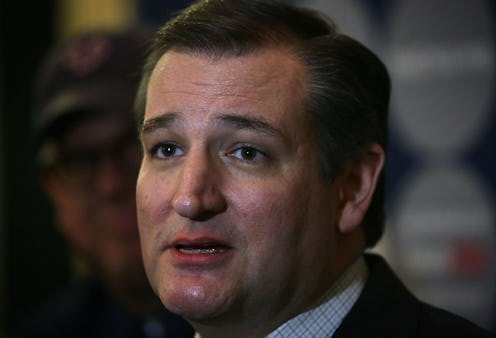News
The GOP's Superdelegate Rules Are Different Now
With the presidential primaries in full swing, you can expect to hear a whole lot more about delegates and superdelegates over the next couple of months. In Iowa, Bernie Sanders and Hillary Clinton outright tied each other, but Clinton's superdelegates put her over the top. What about in the GOP? Do Republicans get superdelegates, and could they tip the nomination?
The technical answer is that yes, the Republican Party does have superdelegates. However, they function differently for the GOP than Democrats, and in 2016, Republican superdelegates will have way, way less power and autonomy than the superdelegates on the Democratic side.
The thing to keep in mind about delegates and superdelegates is that they were created not by Congress or the Constitution, but the parties themselves. The GOP and the Democratic Party are non-governmental organizations, and so they can basically set whatever rules they'd like regarding delegates and how they're distributed.
In the Democratic Party, you're a superdelegate if you're a member of the official party apparatus. That includes all current Democratic governors and members of Congress as well as former presidents, former vice presidents, state party chairs, and that sort of thing. In the Democratic Party, superdelegates can vote for whichever candidate they wish regardless of how the state that they come from votes, and in total, superdelegates comprise about 15 percent of the total delegates that determine the nomination.
The GOP, however, has decided to establish fewer superdelegates than the Democrats. In the Republican Party, the only people who get superdelegate status are the three members of each state's national party. This means that in the GOP, superdelegates are only about 7 percent of the total number of delegates.
The more important distinction, though, is that Republican superdelegates do not have the freedom to vote for whichever candidate they please. The Republican National Committee ruled in 2015 that their superdelegates must vote for the candidate that their state voted for, and that's the biggest difference between Republican and Democratic superdelegates.
In general, superdelegates are a way for the party elite to exert additional influence over the nomination process. If voters were on the verge of nominating a candidate who the party felt didn't have a good shot at winning the general election, the superdelegates might step in and tip the scales.
That could conceivably happen this year on the Democratic side. However, it's simply not possible for Republican superdelegates to override the wishes of Republican voters. Thanks to the rules the national GOP has established, Republican "superdelegates" aren't very "super" at all.
Believe it or not, both primaries and caucuses can be laugh-out-loud hilarious. Don't believe us? Have a listen to Bustle's "The Chat Room" podcast...
